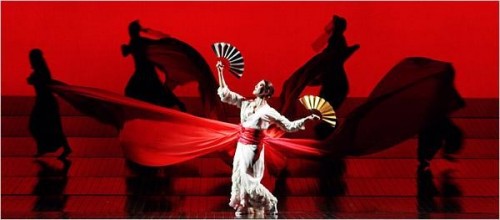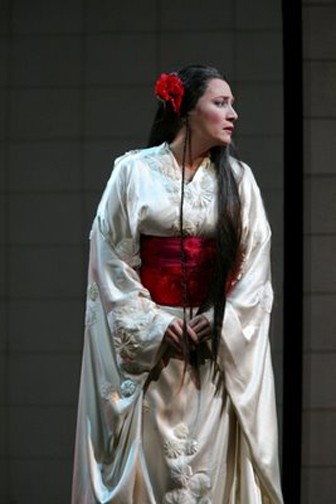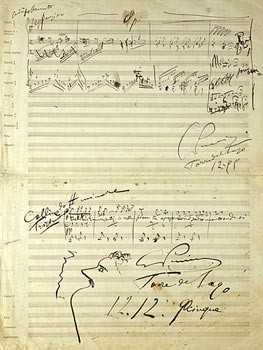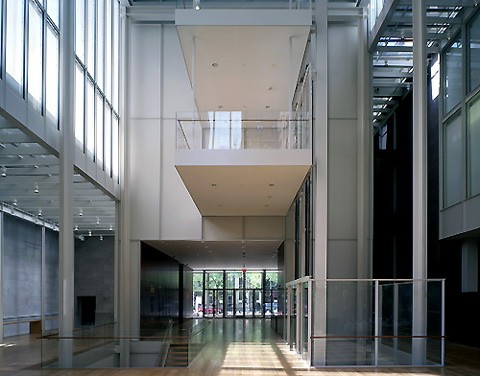Patricia Racette Dialogue at the Morgan Library
Celebrating Puccini's 150th birthday
By: Susan Hall - Dec 04, 2009
Music at the Morgan
Adventure in Italian Opera
A Conversation with Patricia Racette
December 2, 2009
Patricia Racette, one of the leading sopranos at the Metropolitan Opera in New York, Lyric Opera San Francisco, and Houston Grand Opera , spoke on December 2 at the Morgan Library in New York. The lecture on "Adventures in Italian Opera" was co-sponsored by the Morgan and the Casa Italiana of New York University. The evening's moderator was opera and Italian culture aficionado, Fred Plotkin. The Morgan has mounted a charming exhibit, Celebrating Puccini, , which is on view until January 10, 2010, and includes rarely seen original sketches for his acclaimed operas "Madama Butterfly" and "La Bohème", librettos, personal letters, a period poster and playbills, and souvenir postcards. The exhibition is drawn almost exclusively from the Morgan's extensive music holdings. Christmas events and marvelous exhibits on William Blake and Jane Austen are other reasons to visit the Morgan..
Racette is currently performing at the Metropolitan Opera, playing all three roles in Puccini's "Il Trittico," (She is one of only three sopranos - Renata Scotto and Teresa Stratas also played all three roles,who have tried this). Her performance has been praised by critics, and when people didn't realize she'd performed all the roles, she remarked, "Mission accomplished."
While she did not talk about daily vocal exercises in discussing her preparation for a role (and in fact didn't talk about technique at all) she discussed her integration into a role, and bringing together the emotional arc and the line of the music. Interestingly, in talking about the composers who fit comfortably with her, she noted that Mozart and Verdi both composed vertically -- you feel a block tying you down when you hit a note -- whereas Puccini and Janacek are horizontal and create lines to which it's easier for her to attach.
There was considerable discussion about her Elisebetta in Verdi's "Don Carlo", a role that is not seemingly front and center in the opera and yet Mr. Plotkin pointed out, is the role: Verdi gives Elisbetta the last note. (Racette brought down the shed in Tanglewood with this note!) Racette has made Elisabetta a signature role. Nonethelss, she is "terrified" when she undertakes it.
Racaette is refreshingly frank about any subject she takes on. "People don't talk often about competition, but clearly it's there," she said, when Mr. Plotkin asked about the star-studded "Don Carlo" cast. "I am aware of the caliber of singing on the stage with me, and I ratchet up my own performance to match or exceed their's."
Is it necessary to conflate the emotional and the musical in opera? Racette politely replied that of course there are different operatic styles, now and always in opera history. If you inhabit a role as Racette does so successfully, the music and the emotion are successfully merged. The need for emotion and music to be front and foremost can not be dismissed lightly. Many Met productions under the current administration do not appear to value this quality, the sine qua non of great productions.
In the HD form, a performer like Racette is at the top of the casting list, because she effectively portrays a character on the transmissions. Interestingly she said that she did not believe in the grand gesture in most instances. There is occasionally a necessary bravura, but generally, if a performer conveys an emotional arc, the role will work. No matter where you sit in the house, including the rafters, if someone like Racette is on the stage you "get it." This means that she does not look like an over the top actress in the HD's she's done, "Peter Grimes" and "Butterfly", clips of which were shown during the talk. Her chosen style works perfectly. Since she is so very good, let's hope to see her in "Katya Kabanova," "Jenufa," and "Tosca" in HD in theaters in the near future.
Mr. Plotkin found himself on a tarmac in Paris with Racette and introduced himself.
Last fall I found myself seated next to her on at a banquette at Fiorello's restaurant across from the Met. After a brief back and forth about who was going to remove whose big bag, Ms. Racette offered to remove my companion's wallet. The four of us Beth Clayton, her partner, was dining too --had a wide-ranging, informative and often hilarious conversation about "Dr. Atomic," "Don Carlo", James Levine, and Anthony Mingella, the director of "Madama Butterfly" in which Racette gives a stunning performance.
I mention pleasant, chance encounters with the diva, because she noted that her best performances come out of a gregarious mood. This was in answer to a question about exiting from the stage during a broadcast, and facing an interviewer's questions. She clapped her hands and reported she left whatever mood -- even devastation -- on the stage and was quite ready to banter with Rene Fleming, for instance.
Racette is unusually open in a very dignified way. She talked about marriage to Beth Clayton as though it were the most natural lifestyle in the world, I've never heard a diva discuss a story she'd like to commission as an opera, but Racette, talking about the number of world premieres she sings (because she enjoys being part of the development process), immediately said she would like to develop "Aimee and Jaguar." It's a German story about two women who meet during the Second World War, fall in love, and discover that one is Jewish, the other German. Although the rights to the Erica Fisher true story are not available, Racette is trying to obtain them.
Racette started as a jazz singer and dreams that in her retirement she will return to cabaret singing. Her warmly sung story lines in opera may have grown out of cabaret and will in turn enrich her performance when she comes back to it.
If Puccini heard her sing, he might well ask the question he asked only once before of a singer, "Who sent you to me? God?"
.







